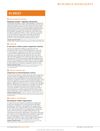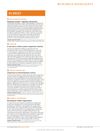 36 citations,
November 1995 in “Clinical endocrinology”
36 citations,
November 1995 in “Clinical endocrinology” Low-dose flutamide helps reduce excessive hair growth and is even more effective with birth control, without bad effects on blood fats.
9 citations,
June 2022 in “Plants” Shallot extract may help with hair growth and treating hair loss.
 117 citations,
May 2017 in “Human Reproduction Update”
117 citations,
May 2017 in “Human Reproduction Update” The update highlights that non-classic congenital adrenal hyperplasia is common in women with excess male hormones, requires specific hormone tests for diagnosis, and has various treatment options depending on age and symptoms.
 97 citations,
November 1986 in “Journal of Steroid Biochemistry”
97 citations,
November 1986 in “Journal of Steroid Biochemistry” Antiandrogens affect androgen-dependent body functions and are used for various medical conditions, with some risks like fetus feminization, but new forms like 17α-propylmesterolone show promise for acne without systemic effects.
 96 citations,
September 2008 in “Seminars in Cutaneous Medicine and Surgery”
96 citations,
September 2008 in “Seminars in Cutaneous Medicine and Surgery” Hormonal treatments, including birth control and antiandrogens, can effectively treat acne in women.
 49 citations,
January 2010 in “International Journal of Pediatric Endocrinology”
49 citations,
January 2010 in “International Journal of Pediatric Endocrinology” The document concludes that Nonclassic Congenital Adrenal Hyperplasia requires personalized treatment plans to manage symptoms and fertility, with glucocorticoids being a common therapy.
 34 citations,
October 2018 in “Journal of The American Academy of Dermatology”
34 citations,
October 2018 in “Journal of The American Academy of Dermatology” Hormone treatments can help with women's skin and hair disorders, but they need careful monitoring and more research.
 26 citations,
January 2020 in “Przegląd Menopauzalny”
26 citations,
January 2020 in “Przegląd Menopauzalny” Menopausal women have higher androgen levels, which can cause symptoms like facial hair growth and low sexual desire.
 26 citations,
October 2016 in “Clinics in Dermatology”
26 citations,
October 2016 in “Clinics in Dermatology” Hormonal treatments can improve acne, but they come with potential side effects and risks.
 24 citations,
January 2013 in “Indian Journal of Dermatology, Venereology and Leprology”
24 citations,
January 2013 in “Indian Journal of Dermatology, Venereology and Leprology” Hormonal treatment is effective for women with acne not helped by usual treatments, especially if they have hormonal imbalances.
 17 citations,
July 2017 in “Molecular and Cellular Endocrinology”
17 citations,
July 2017 in “Molecular and Cellular Endocrinology” Effective treatments for spinal and bulbar muscular atrophy are not yet available; more research is needed.
 14 citations,
March 2010 in “Gynecological endocrinology”
14 citations,
March 2010 in “Gynecological endocrinology” New treatments for excessive hair growth in women include insulin modulators and enzyme inhibitors.
 9 citations,
January 2014 in “Annals of Dermatology”
9 citations,
January 2014 in “Annals of Dermatology” Some breast cancer patients on hormonal therapy may develop male or female pattern hair loss, which can sometimes be improved with topical treatments.
 5 citations,
January 2014 in “Postepy Dermatologii I Alergologii”
5 citations,
January 2014 in “Postepy Dermatologii I Alergologii” Hormonal treatments like birth control pills can improve acne in women with excess hair growth and hormone imbalances.
3 citations,
October 2021 in “Indian Journal of Plastic Surgery” Pattern hair loss is mainly caused by genetics and hormones, with limited effective treatments available.
2 citations,
June 2004 in “Expert review of pharmacoeconomics & outcomes research” Cheap treatments for excessive hair growth in women can improve symptoms by 35-40% after one year.
 1 citations,
May 2004 in “Journal der Deutschen Dermatologischen Gesellschaft”
1 citations,
May 2004 in “Journal der Deutschen Dermatologischen Gesellschaft” The meeting presented new findings on hair stem cells, pigmentation, genetics, and modern hair treatment techniques.
 1 citations,
July 2023 in “Cureus”
1 citations,
July 2023 in “Cureus” Some treatments for hereditary hair loss are effective but vary in results and side effects; new therapies show promise but need more research.
1 citations,
January 2007 in “Humana Press eBooks” Effective treatments for excessive body hair in women include drugs that block androgens, sometimes combined with oral contraceptives.
 October 2021 in “The Egyptian Journal of Hospital Medicine ”
October 2021 in “The Egyptian Journal of Hospital Medicine ” Combination therapies work better than single treatments for atrophic acne scars.
 June 2013 in “Expert Review of Dermatology”
June 2013 in “Expert Review of Dermatology” The article concludes that hormonal therapy is an effective long-term acne treatment, even for those without hormonal imbalances.

Early treatment is important for better hair regrowth in elderly women with hair loss.
August 2024 in “Cosmetics” Personalized treatments for hair loss are becoming more effective by using genetic information.

New treatments for hair loss should target eight main causes and use specific plant compounds and peptides for better results.
 March 2023 in “Revista médica Clínica Las Condes”
March 2023 in “Revista médica Clínica Las Condes” The study suggests a possible increase in androgen receptors in patients with frontal fibrosing alopecia, but more research is needed.

PCOS is a complex condition that can lead to serious health issues, but early diagnosis and treatment can reduce these risks.
August 2020 in “Journal of Womens Health, Issues and Care” PCOS affects many women, causing menstrual issues and infertility, but can be managed with lifestyle changes, medications, and possibly herbal treatments.
 August 2013 in “Nature Reviews Drug Discovery”
August 2013 in “Nature Reviews Drug Discovery” New treatments may restore cancer-blocking proteins, slow prostate cancer, identify drug targets, and potentially regrow hair.
July 1998 in “Annals of saudi medicine/Annals of Saudi medicine” A misdiagnosed case of HAIR-AN syndrome led to unnecessary surgeries and highlighted the importance of correct diagnosis and treatment.
 August 2013 in “Nature Reviews Drug Discovery”
August 2013 in “Nature Reviews Drug Discovery” New treatments for cancer and skin disorders show promise in disrupting harmful cell interactions and promoting hair growth.






















